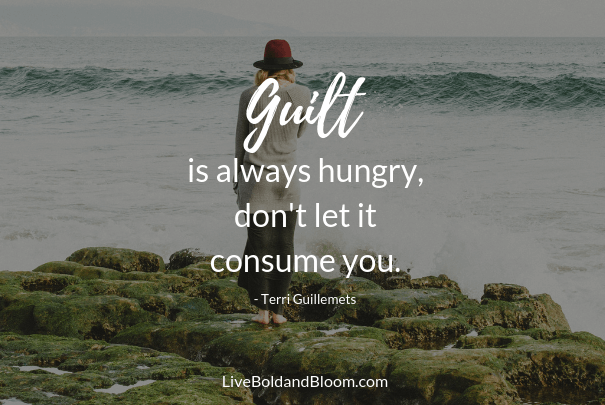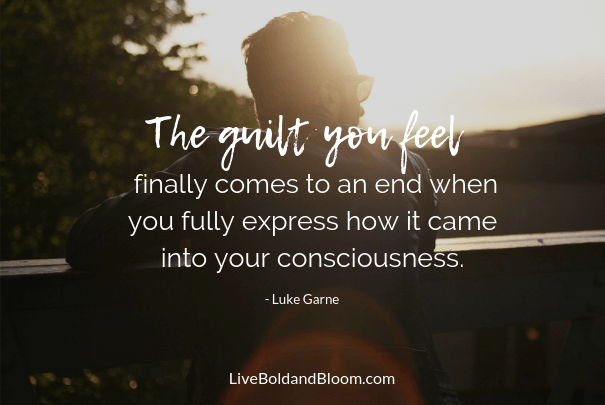Don't you hate always feeling guilty?
It's like dragging around a ball and chain everywhere you go. It's hard to allow yourself to fully enjoy life because guilt constantly holds up a sign reading, “You're not worthy.”
Guilt is an emotion you learn in childhood during the social developmental years. It helps you recognize your behaviors and how they impact other people, and it triggers a warning that you may have done something wrong.
As an adult, this feeling can kick in pretty quickly for even the smallest, most meaningless situations that occur in your life.
Guilt has its place in helping you recognize inappropriate or hurtful actions and words so you can make amends as necessary.
But some guilt lingers for years, long past its expiration date.
How can you combat these feelings and know when they are acceptable and when you should let them go?
Let's first look at some signs of guilt so you know exactly what you're dealing with.
Signs of Feeling Guilty
Everyone is different and may exhibit signs of guilt differently. You can watch for signs of guilt, but you can't assume that just one or two signs point to guilt feelings.
Many of us become distant or angry while trying to process feelings of guilt. But some of us guilty souls may be excessively kind or generous toward the person we might have offended.
Guilt can a double whammy emotion because you feel at fault for a wrongdoing and offending someone else, and you often feel bad about yourself as well.
Other signs of carrying guilt include:
- Nervousness
- Anxiety
- Trouble sleeping
- Loss of appetite
- Poor concentration
- Avoidance of others, particular the offended person
- Guilty body language and no eye contact
- Emotional instability
- Self-punishment
- Resentment toward the offended person
Do any of these signs apply to you? Let's take a step back and look at the situation to decide whether or not you should feel guilty.
Why do I always feel guilty?
You feel guilty, but you can't pinpoint a situation in which you've offended someone or done something wrong. What gives?
If you feel guilty and you can't identify a reason, it is important to realize that you may be holding yourself to impossible standards of perfection.

If you always expect yourself to be perfect, you will feel guilty every time something doesn't play out as you expect it to.
Further, guilt can be caused by traumatizing childhood events that have lasting effects into adulthood.
If you can identify something that happened during your childhood, such as abuse or trauma that still emotionally impacts you, seek the help of a mental health professional to heal and overcome those feelings.
Many sensitive children feel guilty about the pain and problems of their parents.
For example, children of parents who divorce can assume they are at fault for the breakup. We can carry this unconscious guilt with us throughout our youth and into adult years.
Give yourself a break and relax by doing activities that you enjoy if you start to feel guilty for no reason. Recognize the feeling as just an emotion, and try to allow it to pass through rather than attaching to it.
Whether or not your guilt has a legitimate reason behind it, you do need to take action to release the grip guilt has on you and your well-being.
How To Stop Feeling Guilty
Read and practice these 25 tips on how to deal with guilt.
1. Recognize the purpose of your guilt.
Guilt helps people grow and mature after exhibiting offensive or hurtful behavior. It often acts as a warning sign with a purpose — to tell you to change your behavior or risk losing something or someone.
For example, let's say you feel guilty for eating five candy bars in one day. This emotion is your brain’s way of telling you that your behavior is extreme, possibly self-destructive, and can harm your health.
If you recognize the purpose of your guilt, you can try to change your behavior.
2. Make amends or changes as soon as possible.
If your guilt is rational, try to fix the problem as soon as you can. Leaving yourself feeling guilty will weigh you down while you're trying to move on with your life.
If your guilt is healthy, it is letting you know that you need to do something different to repair some relationships in your life.
You might already know what your guilt is trying to tell you, but it will continue to nag you until you make amends.
3. Determine whose standards are driving you.
Sure, your co-worker might regularly stay at work until 7:00 pm when you're typically out of there by 5:00.
But if you are getting your work done, and your schedule works for you, don't worry about what other people are doing.
Don't try to live up to other people's standards if they are not the same as your own.
Related Post: How Not to Care What People Think
4. Look forward, not backward.
So, you messed up. Rather than wasting your time trying to think of everything you want to go back and change, focus on the things you can do right now.
Guilt is sometimes caused by regretting something in the past, so it's important to recognize that you can't go back and change those actions.
Focus on action items that you can do this very second, like apologizing or changing your behavior.
5. View guilt as an opportunity instead of a punishment.
The feeling of guilt gives you the chance to make amends and notice some things that you may be doing in your life that aren't in line with your morals or values.
Instead of thinking of this feeling as a punishment, take it as an opportunity to grow. Learn from it and then let it go.
6. Write in a journal.
Writing a journal entry about the details and feelings associated with the situation can help you learn about your actions.
You may choose to journal about how you felt about yourself and the other people involved in the situation, what your needs were and if they were met, and what your motives were.
7. Focus on quality, not quantity.
Guilt arises when you believe you're not doing enough for other people. But you only have so much of yourself available to give.
Remember that the quality of your help erodes if you try too hard to help everyone.
Be discerning about who you offer help to and how much time you have to give. Develop a more reasonable view of how much responsibility you have for other people.
Doing this will also improve the quality of the help you offer and remind you of the positive things you're doing instead of what else you could be doing.

8. Spend time with supportive, accepting people.
If someone completely accepts you for who you are, keep that person in your life. Anyone who displays unconditional love or compassion for you can inspire you to develop this same attitude toward yourself.
However, remember that you are responsible for your own self-acceptance and self-compassion, and you must make the effort to like yourself even if others don't validate you.
9. Talk to a mental health professional.
If you are dealing with a sense of guilt that is interfering with your life, you may need the help of a professional to help you resolve the issues. Find a qualified and certified mental health counselor so they can help you sort through your feelings.
Therapists can also work with various family members to help resolve feelings of guilt and anger that are impacting the whole family.
10. Practice gratitude.
Guilt makes you feel like you're a bad person, but that is certainly not the case. Make a gratitude list of all of the things that you have gotten right, situations you have handled well, and the positive qualities you possess.
Put it somewhere that you can see it every day, so whenever you start to feel guilt creeping in, you can refer to your list. Use your positive mindset to challenge your feelings of guilt and replace them with feelings of gratitude.
Related: How To Love Yourself: 26 Ways To Cultivate Self-Worth
11. Find a balance.
The universe is always balanced, so apply that to your own life and do a good deed to balance out whatever you are feeling guilty about.
Any small act of service or kindness will bring you and the recipient of your kind act some joy. Find a balance in your life and your actions, and remind yourself that you’re a good person.
12. Apologize.
The fact that you feel guilty is telling you that you didn't take the right action. Reach out to the person you hurt, make a heartfelt apology, ask for forgiveness, and offer to make amends.
Make sure that you apologize sincerely because you genuinely regret what you did, not because someone is telling you to do it.
13. Identify the values that governed your actions.
Do you still agree with those values? For example, did you think to yourself that it was ok to cheat on a test when no one was looking since you'll never be found out? Maybe making an A was more important to you than honest effort.
How do you feel about that mindset now? Reconsider your value system and align your actions with those values.
Think about how living outside of your value system hurt you in the past and disappointed or hurt someone else and strive to honor your values going forward.
14. Consider how you would treat others for the same action.
This may help you realize that you are being too hard on yourself.
If you think you could easily forgive a friend for doing whatever you did, you may be able to overcome your feelings of guilt.
We are all human and make mistakes. When you accept that, it becomes easier to forgive yourself and show yourself some compassion.
15. Write a letter to yourself.
Be empathic and understanding in your letter, as if you were writing it to a friend.
Put the letter away for a few days, and then come back and read it. This can help you forgive yourself and be more accepting of your human flaws.
Pull it out and read it any time you start to feel guilty.
16. Repeat affirmations on a daily basis.
You may have to actually tell yourself every morning that you are a good person who is allowed to make mistakes.
Use affirmations to tell yourself that you love yourself and that you forgive yourself.
Related: 31 Ways To Find Out What To Do With Your Life
17. Redeem yourself.
Guilt can be prolonged if don't feel we're getting the punishment we deserve — or we have been let off of the hook too easily for our mistakes.
This can be an unhealthy feeling, but it’s also helpful when you recognize this emotion and take the right steps to move past it.
Give up a few things that you enjoy for a while, such as watching your favorite TV show or buying your favorite daily coffee drink.
Giving up some small pleasures can make you feel like you're paying for your actions.
18. List the things you can and can't control.
Doing this will help you realize whether or not you should blame yourself for something.
Keep in mind that you can't blame yourself for things you regret not doing since you didn't have foresight at the time. You made the best decision for yourself given the information you possessed.
It's also important to avoid blaming yourself for surviving a tragedy that someone else did not. This is a common reaction for survivors, but use positive self-talk to remind yourself that you're not at fault.
19. Determine the catalyst for the situation.
Was there something specific that set you off to make a bad decision or doing something you now regret?
If so, has this happened in the past?
You may need to evaluate the power this trigger has in your life, whether it is a person or an event, and think about ways you can avoid it in the future.
20. Stop punishing yourself.
Even if you did a terrible thing, you don't have to endlessly punish yourself. Learn from your mistake and don't do it again.
You may feel undeserving of success or happiness after you make a mistake, which can lead to self-sabotaging behavior.
Don't prevent yourself from being happy, as it won't change whatever you did and will only increase your misery.
The best way to heal a regrettable decision is to make better decisions going forward and live your life with joy and gratitude.
21. Consult a friend.
If you replay a situation over and over in your head, it is bound to make you feel worse.
Instead of falling into that rabbit hole, get a new perspective by talking it over with a close friend.
Even if you are in the wrong and did something awful, a good friend can help you work it out as best as possible and help you ensure it doesn't happen again.

22. Meditate.
There are many benefits to practicing meditation including emotional release.
Meditating on a regular basis allows your inner emotions to float through your mind without attaching to them.
It can help you let go of any guilt you are holding onto recognizing that guilt is simply a feeling.
Mindfulness and other meditative practices can help you observe your mental processes, including the tendencies you have, such as self-blame and self-criticism, that feed your guilt.
Related: 12 Essential Ways To Take Care of Yourself
23. Accept it and move on.
If you did something wrong, you have to accept it and realize you can't change the past. Apologize, and then let it go.
The more you focus on thinking you need to do more, the more it will bother you and interfere with your life.
Obsessing about your feelings of guilt without taking action to compensate for your behavior will keep the negative feelings alive.
24. Learn from the experience.
Remember, the purpose of guilt is to get your attention so you learn something from the situation. By learning from your behavior, you will be less likely to repeat it in the future.
As with failure, guilt gives you the opportunity for self-awareness and radical self-honesty. It is through these exercises that you make the biggest leaps in your personal growth.
25. Remember that no one is perfect.
Even those who appear to be perfect are not. Trying to be perfect in any way is sure to lead to failure.
Everyone makes mistakes, and many people do things that eventually lead to feelings of guilt and remorse.
Acknowledge your mistake and accept that you’re human without spending days, weeks, or months blaming yourself because you “should have” known.
Recognize that emotional intelligence requires accepting the parts of yourself that are flawed and knowing these flaws are part of the human condition.
Guilt is an emotion that sends you an important message. But remember that not every feeling, and definitely not every guilty feeling, is rational.
Pay attention to guilt feelings when you have caused pain or upset for others.
Try to heal guilt from childhood adversity. Work to override guilt that stems from the desire to be perfect.
Be skeptical when you feel guilty and ask yourself if the feelings relate to a legitimate misdeed, or rather they are an irrational response to a situation or past event.
Answering this question is the first step in better coping with feelings of guilt in the future.
Did you find any value in overcoming the feeling of guilt?
I hope you'll use these 25 tips on dealing with guilt to improve your life.
Would you like to help others?
It would be really great if you could help me share this post on feeling guilty. Would you be willing to share these ways to stop feeling guilty on your preferred social media platform?

